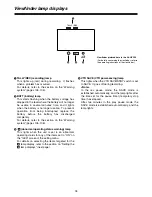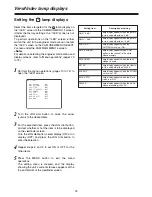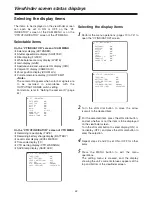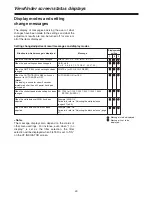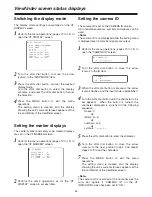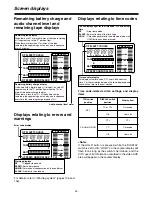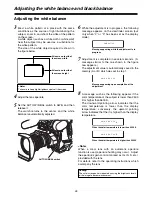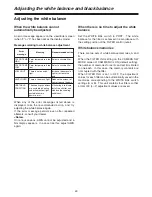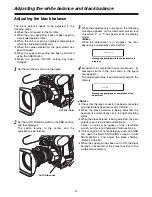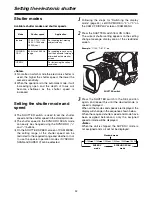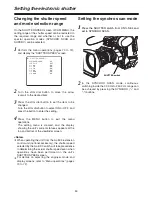
47
Adjusting the white balance and black balance
Adjusting the white balance
1
Set the switches as shown in the figure.
FILTER control
WHITE BAL: A or B
OUTPUT: CAM
GAIN: Normally 0 dB
Set to a more suitable gain level if it is
too dark.
When the GAIN and WHITE BAL switch settings
are changed, messages advising the user of the
set positions appear on the setting change
message display of the viewfinder screen.
(However, this happens only when “3” has been
set as the display mode.)
2
Select the FILTER control setting in accordance
with the lighting conditions.
O
For examples of the FILTER control settings,
refer to the description of the FILTER control
(page 13) in the “Shooting (recording)/playback
function section.”
When the FILTER control setting is changed, a
message advising the user of the set positions
appears on the setting change message display
of the viewfinder screen. (However, this
happens only when “3” has been set as the
display mode.)
A better picture can be achieved by adjusting the
white balance and black balance in the following
sequence: AWB (white balance adjustment)
5
ABB
(black balance adjustment)
5
AWB.
There is usually no need to re-adjust the black
balance even when the power has been turned off
and back on.
The white balance must always be re-adjusted when
the lighting conditions have changed.
If the display mode is set to “2” or “3,” messages
advising the user of what progress has been made in
the adjustments and what the adjustment results are
appear on the viewfinder screen when the black
balance or white balance adjustment is commenced.
Set the display mode to “1” if these messages are not
to be displayed.
O
For details on the display mode settings, refer to
“Display modes and setting change messages”
(page 43).
<Notes>
O
ABB must be performed when the MASTER GAIN
levels have been changed on the LOW SETTING,
MID SETTING and HIGH SETTING screens of the
CAM MENU, when the super gain setting has been
changed using the USER button, and when the
GAMMA (ON/OFF) has been switched on the
CAMERA SETTING screen.
O
With artificial lighting—particularly fluorescent lights
and mercury lamps—the luminance may appear to
be constant but the intensity of the R, G and B
colors will change in synchronization with the power
line frequency. Especially in regions with a 50 Hz
power line frequency, mutual interference arises
between the vertical sync frequency (approx. 60
Hz) of this unit and lighting frequency (50 Hz). As a
result, the hue tends to change with the passage of
time or flickering occurs, making it impossible to
achieve a proper white balance.
It is recommended that the white balance be
achieved using the settings shown in the table
below.
Power line frequency
Shutter speed
50 Hz
1/100
60 Hz
OFF
Содержание AJ-HDC20
Страница 1: ...AJ P Camera VTR Operating Instructions ...






